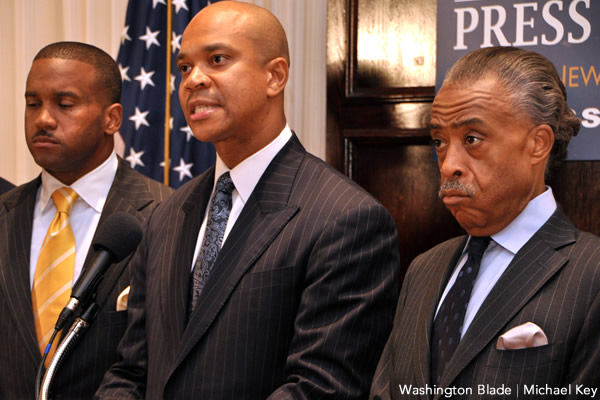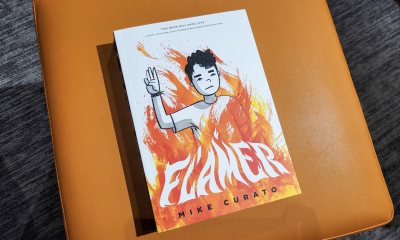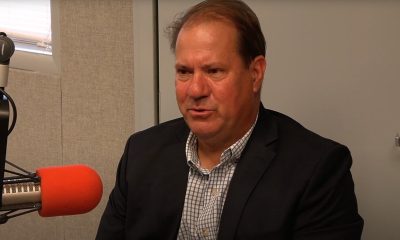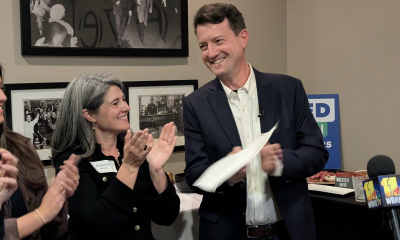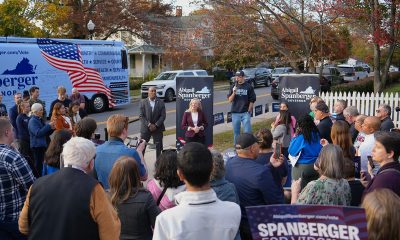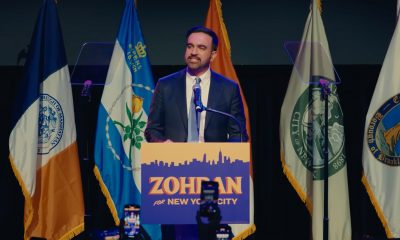Local
Black clergy back Md. same-sex marriage law
Al Sharpton and others spoke at downtown D.C. press conference
A group of prominent black clergy today urged Maryland voters to support the state’s same-sex marriage law in the November referendum.
“As pastors and clergy leaders, we are here today to declare our unequivocal support for Maryland’s Civil Marriage Protection Act and to dispel the myth that all African American pastors are fundamentally opposed to the idea of marriage equality,” said Rev. Delman Coates, senior pastor of the 8,000 member Mt. Ennon Baptist Church in Clinton, Md., during a press conference at the National Press Club in downtown Washington. “For too long the issue of equal treatment under the law for gay and lesbian couples has been mired in a theological debate between those on the one hand who oppose same-sex marriage based upon their religious beliefs, and those on the other who affirm it based upon theirs. And while this is a legitimate discussion for people of faith to have, the appropriate arena that conversation is the house of worship, the seminary, the Bible study or some other religious setting.”
Rev. Howard-John Wesley, senior pastor of Alfred Street Baptist Church in Alexandria, Va., echoed Coates. He noted during the press conference that many of his congregants live in Maryland — specifically Prince George’s County.
“I will impress upon my membership to vote yes on this issue on the Nov. 6 ballot referendum simply because this act is civil, not religious,” Wesley said. “In no way [does] it [infringe] upon our religious freedom as an institution to define marriage as we would, to perform the rite of marriage according to our doctrinal believes nor in the same way does it infringe upon the state to protect the civil liberties of all its residents.”
Rev. Christine Wiley of Covenant Baptist United Church of Christ in D.C.; joined Rev. Brad Braxton of Open Church and Rev. S. Todd Yeary of Douglas Memorial Community Church in Baltimore; Rev. Frederick Haynes of Friendship-West Baptist Church in Dallas; Rev. Otis Moss, III, of Trinity United Church of Christ in Chicago; Rev. Amos Brown of Third Baptist Church in San Francisco and others at the press conference.
Rev. Al Sharpton, president of the National Action Network, applauded Coates and other black clergy for their support of Maryland’s same-sex marriage law.
“This is not an issue about gay or straight,” said Sharpton at the press conference. “This is an issue about civil rights and to take a position to limit the civil rights of anyone is to take a position to limit the civil rights of everyone. You cannot be a part-time civil rights activist. You cannot be for civil rights for African Americans, but not for gays and lesbians.”
This announcement comes less than two months before Marylanders will vote in the referendum on the same-sex marriage law that Gov. Martin O’Malley signed in March.
A Hart Research Associates survey conducted in late July found that 44 percent of black Marylanders would support Question 6, compared to 45 percent who would oppose it. A Public Policy Polling survey in May found that 55 percent of the state’s black voters support marriage rights for same-sex couples.
Benjamin Jealous, president of the Baltimore-based National Association for the Advancement of Colored People is among the prominent black leaders who have backed Question 6. Same-sex marriage advocates and others have noted that both President Obama’s support of nuptials for gays and lesbians and the NAACP Board of Directors’ resolution in support of the issue have had what they describe as a positive impact on public opinion among black voters.
Bob Ross, president of the Prince George’s Branch of the NAACP, appeared in a new web ad earlier this week in support of Question 6. The civil rights organization’s Maryland State Conference and Baltimore affiliates have also backed same-sex marriage, while other black supporters of nuptials for gays and lesbians appeared in a separate web ad that Marylanders for Marriage Equality released in July. Bishop Harry Jackson of Hope Christian Church in Beltsville remains one of the most prominent Question 6 opponents.
Josh Levin, campaign manager for Marylanders for Marriage Equality, the group defending the state’s same-sex marriage law, conceded in a fundraising pitch to supporters on Thursday that his group has only been able to purchase a week’s worth of television air time “in some places so far.” This admission comes on the heels of what he described as the “four weeks of commercial time on TV stations across Maryland” that Question 6 opponents have already bought.
“Our opponents are smart, well-funded and willing to play on the politics of race and fear in order to win,” wrote Levin in the e-mail that stresses Marylanders for Marriage Equality needs to raise $500,000 over the next two weeks to counter these ads. “And we know from past experience in other states that if we let them have the airwaves to themselves, we will lose.”
Sharpton noted to the Washington Blade during the press conference that he appeared in an ad ahead of the same-sex marriage bill’s passage in February.
“One thing I’ve never been accused of being is bashful,” he said when asked if Marylanders for Marriage Equality had asked him to appear in a pro-Question 6 spot. “I’ll do whatever because I see this as a civil rights issue.”
“This is a full court press,” Coates said. “In the remaining days and weeks leading up to Nov. 6, there are a variety of strategies that we can do and engage in across the state to educate further persons, to educate Marylanders about what this is about and what it is not. This is a full-court press and we’re creating strategies.”
District of Columbia
High cost of living shuts essential workers out, threatens D.C.’s economic stability
City residents don’t always reflect those who keep it running
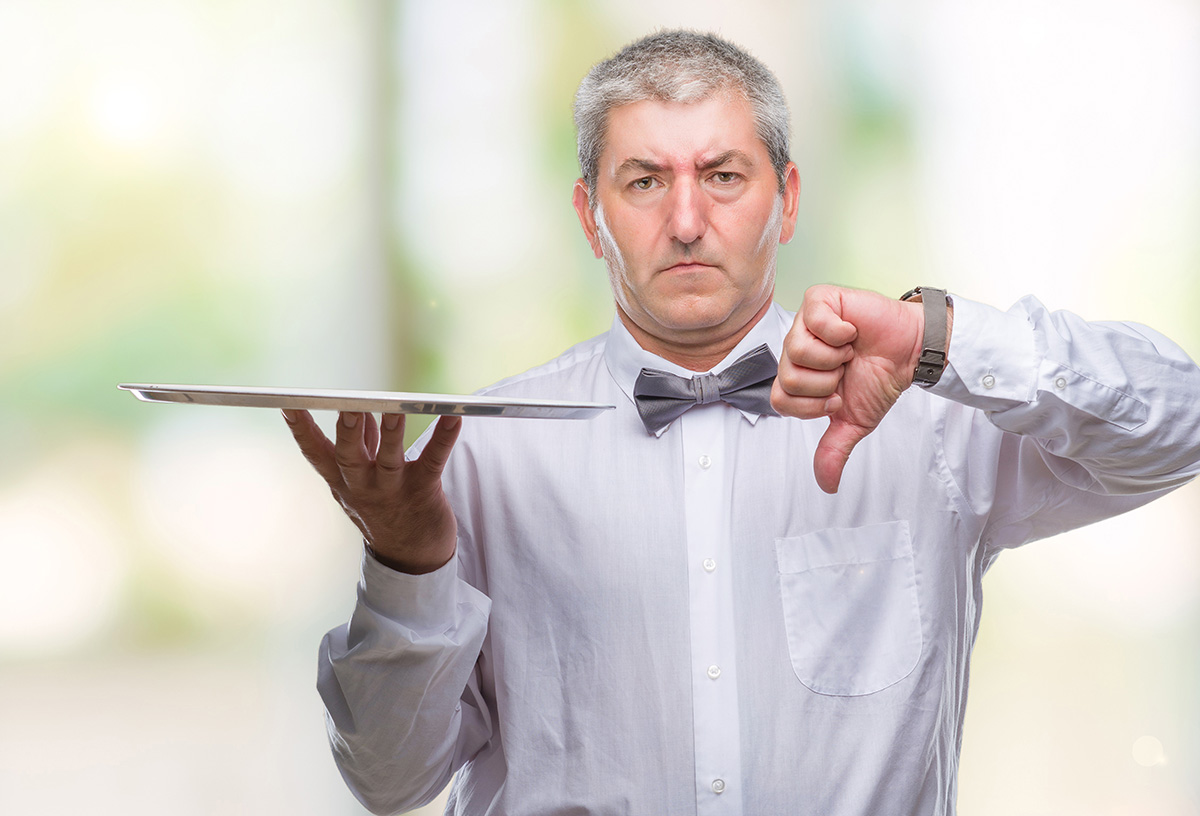
When Nic Kelly finishes her 6 a.m. shift as a manager at PetSmart, she walks to her bartending job at Alamo Drafthouse in Crystal City to serve cocktails, beers, and milkshakes for hundreds of guests.
Kelly, 26, doesn’t work a combined 60-65 hours per week to pocket extra cash –– she does it to barely make her almost $1,700 rent each month.
“I’m constantly working, and some days I work two jobs in the same day,” Kelly said. “But twice now I’ve had to borrow money from my mother just to make sure I pay my full rent.”
Yesim Sayin, D.C. Policy Center executive director, said this is unfortunately how the D.C. area is structured –– to keep essential workers, service employees, and lower-income people out and those with greater economic mobility in.
The DMV area’s high cost of living makes it near-impossible for employees who keep the area running to make a living, Sayin said. In 2022, only 36% of D.C.’s essential workers lived in the city, according to a D.C. Policy Center report. D.C. is also ranked 13th in the world for highest cost of living as of Nov. 7.
But for Sayin, there’s more work for policymakers to get done than simply acknowledging the high cost of living. Take a look at how current policies are impacting residents, and what long-term solutions could help the DMV thrive.
Feeling the high cost of living
D.C. has the highest unemployment rate in the country at 6.0% as of August. Sayin said the city’s high unemployment rate reflects a lack of geographic mobility in its population, meaning those who can’t find jobs can’t afford to look outside of the DMV area.
Though there are job training groups working to close the unemployment gap, securing a job –– let alone two –– rarely guarantees a comfortable lifestyle for essential and service employees.
A single-person household in D.C. with no children must make at least $25.98 an hour to support themselves, according to the Living Wage Calculator. That number jumps to $51.68 an hour for a single adult with one child. Minimum wage in D.C. is $17.95 an hour and $10 an hour for tipped employees.
Whether it’s utilizing free meals at the Alamo to save on groceries or borrowing money to make rent, every week could bring a different sacrifice for Kelly.
While Kelly lives and works a few minutes south of D.C., Sayin said the connectedness of the DMV means you don’t have to travel far to feel the withering effects of the area’s high cost of living.
“People don’t really care what flag adorns their skies,” Sayin said. “They’re looking for good housing, good schools, cheaper cost of living, and ease of transportation.”
For those that stay in the DMV area, those conditions are hard to come by. This can lead to people working multiple jobs or turning to gigs, such as Uber driving or selling on Etsy, to fill income gaps. Sayin said there are short-term benefits to securing these gigs alongside a primary job, such as helping people weather economic storms, avoid going on government assistance or racking up debt.
But she said the long-term implications of relying on gigs or other jobs can harm someone’s professional aspirations.
“You can spend three extra hours on your own profession every work week, or you can spend three hours driving Uber. One gives you cash, but the other gives you perhaps a different path in your professional life,” Sayin said. “And then 20 years from now, you could be making much more with those additional investments in yourself professionally.”
There’s a strong demand for work in D.C., but when the city starts suffering economically, those who live outside the area –– usually essential or remote workers –– will likely find work elsewhere. Sayin said this negatively impacts those employees’ quality of life, giving them less professional tenure and stability.
D.C.’s cost of living also centralizes power in the city, according to Sayin. When lower-wage employees are priced out, the residents who make up the city don’t always reflect the ones who keep it running.
“Ask your Amazon, Uber or FedEx driver where they live. They’re somewhere in Waldorf. They’re not here,” Sayin said.
Working toward an accessible D.C.
Build more. That’s what Sayin said when thinking of ways to solve D.C.’s affordability crisis.
But it’s not just about building more –– it’s about building smartly and utilizing the space of the city more strategically, Sayin said.
While D.C. has constructed lots of new housing over the years, Sayin noted that they were mostly built in a handful of neighborhoods tailored to middle and upper-class people such as The Wharf. Similarly, building trendy small units to house young professionals moving to the city take up prime real estate from struggling families that have much less geographic mobility, she said.
“The affordability problem is that today’s stock is yesterday’s construction,” Sayin said.
Solving these issues includes ushering in a modern perspective on outdated policies. Sayin cited a D.C. policy that places restrictions on childcare centers built on second floors. Since D.C. parents pay the highest rates in the country for childcare at $47,174 annually, she said loosening unnecessary restrictions could help fuel supply and lower costs for families.
Sayin said policymakers need to consider the economic challenges facing residents today, and whether the incentives and tradeoffs of living in D.C. are valuable enough to keep them in the city.
For Kelly, the incentives and tradeoffs of staying in the DMV area aren’t enough. She’s considered moving back in with her mom a few times given how much she has to work just to get by.
Aside from wanting higher compensation for the work she does –– she noted that businesses can’t operate without employees like her –– Kelly also questioned the value of the tradeoff of moving so close to the city.
“There’s no reason why I’m paying $1,700 for a little studio,” Kelly said. “You also have to pay for parking, utilities aren’t included and a lot of residents have to pay for amenities. We are just giving these property management companies so much money, and we’re not really seeing a whole lot of benefit from it.”
Sayin said placing value on the working people of the city will inject fresh life into D.C.’s economy. Without a valuable tradeoff for living in or around the city, there’s little keeping essential and service employees from staying and doing work taken for granted by policymakers.
District of Columbia
Activist hosts Diwali celebration in D.C.
More than 120 people attended Joshua Patel’s party on Nov. 9.
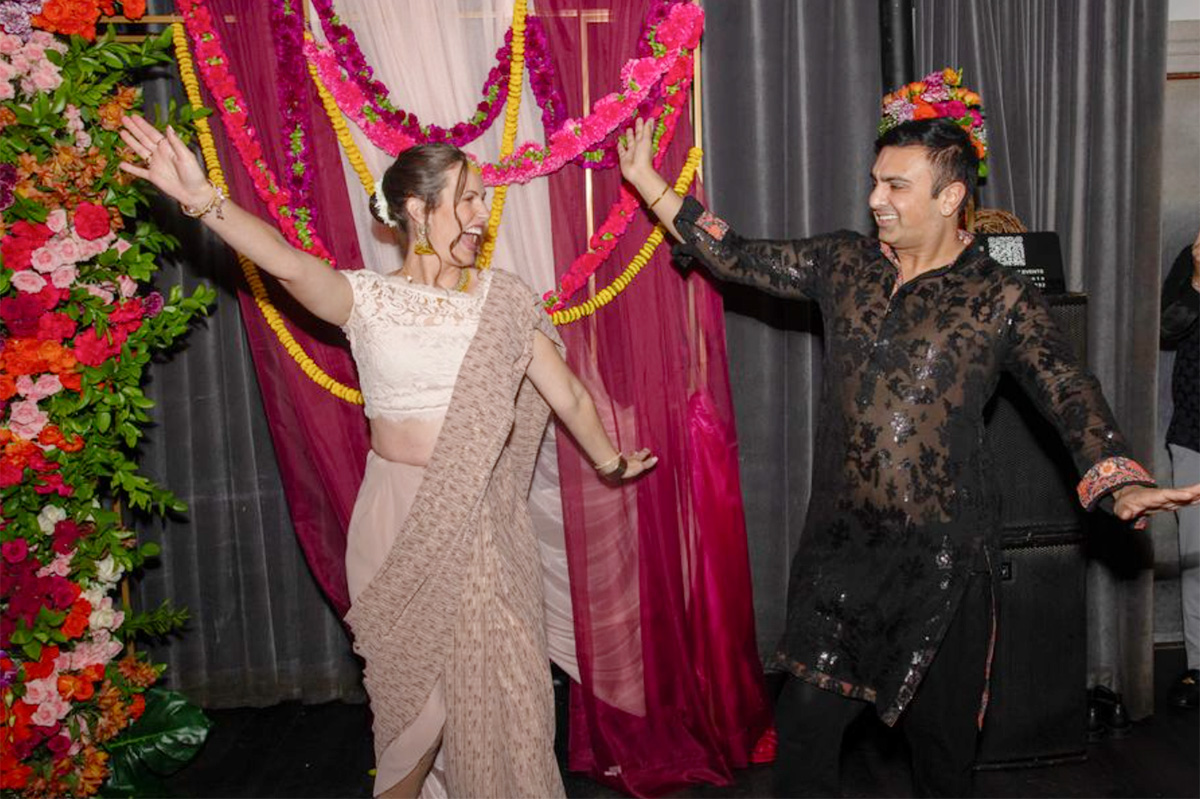
LGBTQ activist and businessman Joshua Patel hosted a community Diwali party on Nov. 9.
Patel organized the event as a community gathering amid the Trump-Vance administration’s policies against LGBTQ inclusion and DEI. The event, held at the Capo Deli speakeasy, drew more than 120 attendees, including local business leaders.
Patel is a franchise owner of ProMD Health, recently awarded as the best med spa by the Washington Blade. He is also a major gift officer at Lambda Legal.
Patel noted that upon moving from New York to Washington in 2022, he desired a chance for community-based Diwali celebrations. He stated that the city offered minimal chances for gatherings beyond religious institutions, unless one was invited to the White House’s Diwali party.
“With our current administration, that gathering too has ended — where we cannot expect more than Kash Patel and President Trump lighting a ‘diya’ candle on Instagram while simultaneously cutting DEIB funding,” Patel said.
In addition to celebrating the festival of lights and good over evil, Patel saw the event as a moment to showcase “rich, vibrant culture” and “express gratitude.”
Patel coined the celebration a “unifier.”
“From a spiritual angle, Shiva was the world’s first transgender God, taking the form of both “male” and “female” incarnations,” Patel said. “The symbolism of our faith and concepts are universal and allows for all to rejoice in the festivities as much or little as they desire.”
Savor Soiree, DMV Mini Snacks and Capo Deli catered the event. DJ Kush spun music and Elisaz Events decorated the Diwali celebration.
The Diwali party also featured performances by former Miss Maryland Heather Young Schleicher, actor Hariqbal Basi, Patel himself and Salatin Tavakoly and Haseeb Ahsan.
Maryland
Harford school board appeals state’s book ban decision to circuit court
5-2 ruling in response to ‘Flamer’ directive
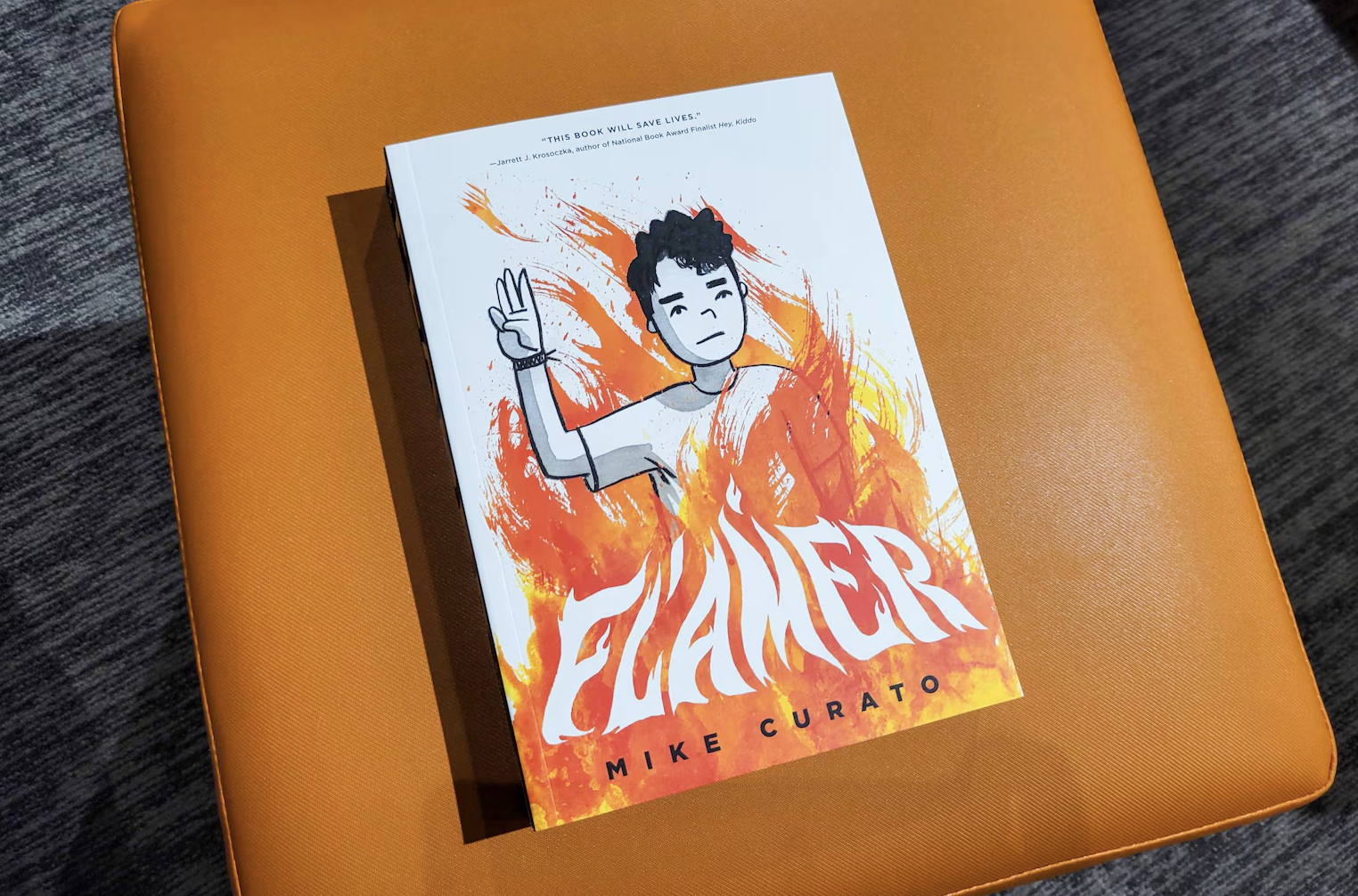
By KRISTEN GRIFFITH | Marking a historic moment in Maryland’s debate over school library censorship, Harford County’s school board voted Thursday to appeal the state’s unprecedented decision overturning its ban of a young adult graphic novel, pushing the dispute into circuit court.
The 5-2 vote followed a recent ruling from the state board overturning Harford’s ban of the book “Flamer.” In a special meeting Thursday afternoon, board members weighed whether to seek reconsideration or take the matter to circuit court — ultimately opting to appeal.
The book “Flamer” is by Mike Curato, who wrote about his experience being bullied as a kid for being gay.
The rest of this article can be found on the Baltimore Banner’s website.
-

 Politics4 days ago
Politics4 days agoPro-trans candidates triumph despite millions in transphobic ads
-

 Opinions4 days ago
Opinions4 days agoDemocratic Socialism won’t win the whole country
-

 National4 days ago
National4 days agoUS bishops ban gender-affirming care at Catholic hospitals
-

 Maryland5 days ago
Maryland5 days agoSalisbury, Md. rainbow crosswalk removed on Veterans Day

